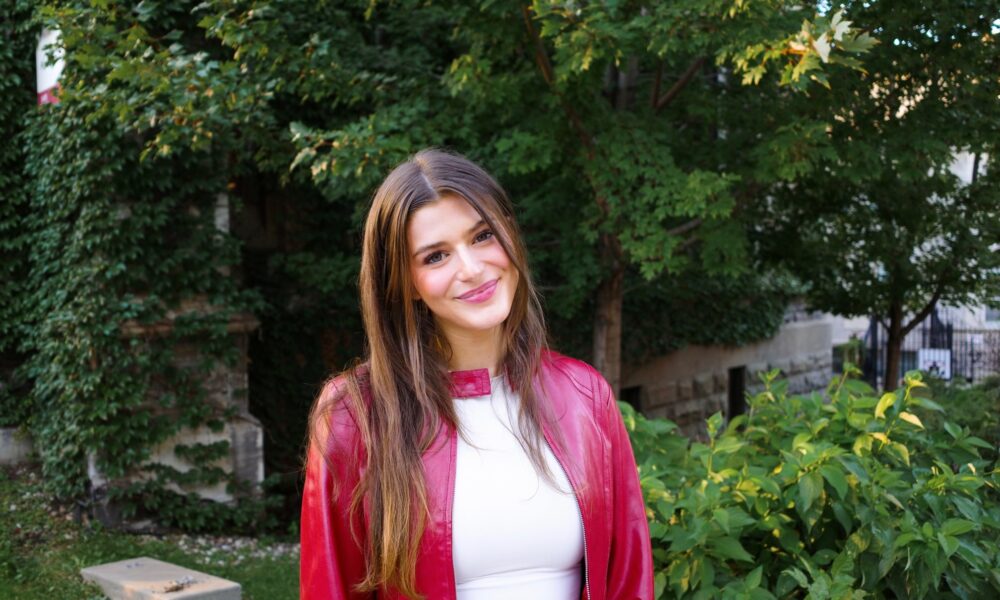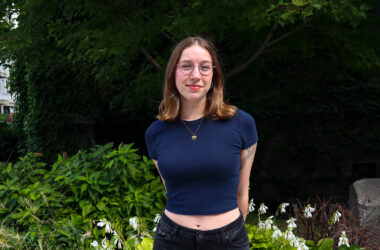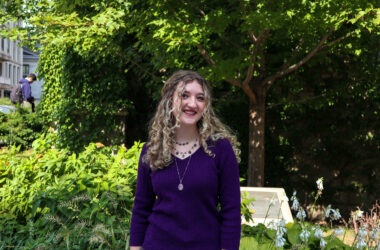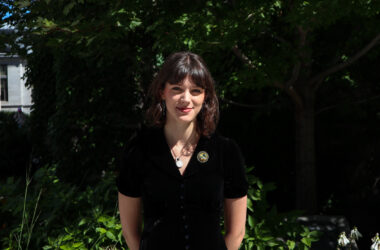Last year, I was having a conversation with a friend on campus. She shared her sense of internal conflict as a member of Montreal’s Jewish community, and her challenges in reconciling the views she grew up around with the headlines and protests surrounding her. Eventually, she turned to me and said: “But what I struggle with in how you express your views is—do you not care about Jewish people—your people?”
I was startled. Why did my support for Palestine translate to her as a disregard for Jewish livelihoods? I contemplated how to answer such a loaded question, and was immediately transported back to my hometown in Madison, Wisconsin, seven years ago.
In 2017, on the eve of Rosh Hashanah, the memorial next to my synagogue was desecrated with swastikas and pro-Trump slogans. At the age of 13, I didn’t fully grasp the gravity of the situation or the degree to which escalating acts of anti-Semitism were fueled by white nationalism. But I felt an intrinsically altered atmosphere as I entered the Gates of Heaven synagogue that year. A temple normally brimming with renewed faith and joy was obscured by fear and apprehension, which persisted throughout the High Holy Days services.
In my family, as we fast through Yom Kippur, the Day of Atonement, we each choose a book to read in its entirety as a method of reflection. That year, I opted for The Book Thief, a novel documenting a young girl growing up in Nazi Germany. As I turned each page and the descriptive violence and hatred directed towards Jewish people mounted, tears welled in my eyes. Why didn’t people do more to stop this?
“And that’s why I will always advocate for Palestinians’ right to peace, sovereignty, and dignity,” I responded to my friend. Being Jewish—being a part of a religious group that has been persecuted and targeted time and time again—means we don’t get to just care about ourselves. We know what atrocities can occur with that outlook. Unequivocally standing against any crime against humanity is how I honour my Jewish identity.
Right now—today, and every day until liberation—that means standing in solidarity with Palestine, and against the military state of Israel, as it persists in committing unjustifiable acts of genocide and settler-colonialism, under the establishment of an apartheid system where Jews are granted more rights than non-Jews. I will always condemn acts of antisemitism, but I refuse to succumb to the rhetoric that our safety is dependent upon the oppression of others. And I repudiate the dangerous conflation of Israel and Judiasim, which enables accusations of antisemitism to be weaponized, particularly against those advocating for Palestinian rights.
Equating Israel with Judaism—a logic deeply intertwined with the foundation of Israel and deliberately perpetuated by its leaders—exposes the problematic argument my friend expressed: That criticism of Israel and Zionism is inherently criticism of Jewish people—and, therefore, is an antisemitic threat to all Jews. This oversimplification reduces a diverse, multifaceted religion to the policies of a single country. Unfairly linking Jewish identity to the actions of the right-wing Israeli state manufactures a paradox in which Israel is beyond critique. In doing so, it silences legitimate and necessitated objections to violence, and ironically, fuels antisemitism by using Jewish identity as an impenetrable shield for state-sanctioned brutalities. As Jews, we have a moral obligation to resolutely reject any justification of atrocities committed in our name.
Far from offensive, criticizing the extremist Israeli government should be viewed as an act of care that mutually benefits all; the ethno-nationalist state that subjugates and dehumanizes Palestinians under the pretext of Jewish safety is antithetical to that very purpose. The Jewish struggle should always be for justice, liberty, and life. It cannot be tainted by hatred. As we face acts of antisemitism, we must counter divisiveness with solidarity, and demand collective liberation. Like other forms of nationalism, we should resist a Zionist doctrine that teaches fear, mistrust, and that the best response to Jewish vulnerabilities is more bullets, a taller wall, a more humiliating checkpoint. I cannot selectively care about Jewish people without advocating for a future where Palestinians can live freely, with sovereignty and dignity. Our lives are all inextricably intertwined.







